Green supply chains promote high quality development
2020-12-10GoldenBeeGoldenBee0
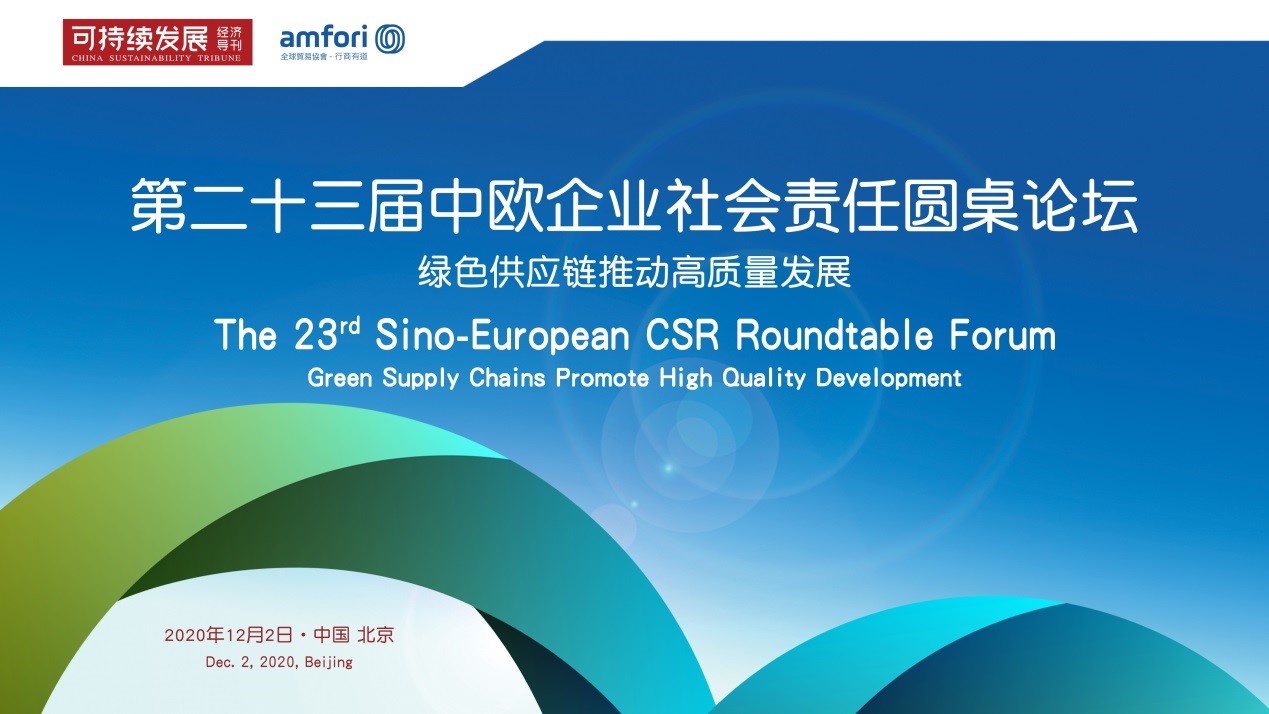
On December 2, 2020, the 23rd Sino-European CSR Roundtable Forum, co-organized by the amfori and China Sustainability Tribune, was held in Beijing.
Focusing on "Green Supply Chains Promote High Quality Development", the Forum invited representatives from governments, associations, research institutions, international organizations, well-known companies and sustainability experts to share their perspectives on how to engage in green supply chain management and promote high-quality economic development in post COVID-19 era.
Government: Policies offer development opportunities
Focusing on "Green Supply Chains Promote High Quality Development", the Forum invited representatives from governments, associations, research institutions, international organizations, well-known companies and sustainability experts to share their perspectives on how to engage in green supply chain management and promote high-quality economic development in post COVID-19 era.
Government: Policies offer development opportunities
2020 marks the concluding year of the 13th Five-Year Plan(2016-2020) and also the crucial period to prepare the 14th Five-Year Plan. China's Proposals for Formulating the 14th Five-Year Plan (2021-2025) for National Economic and Social Development and the Long-Range Objectives Through the Year 2035 specifies a series of tasks on green and low-carbon development, and clearly puts forward the requirement to implement sustainability deeply, improve the overall coordination mechanism for ecological progress, build a system for ecological progress and facilitate the comprehensive green transition of economic and social development. This brings new development opportunities for the green supply chains.
Mr. Xu Hua, Director, General Office, Department of Industrial Policies, Laws and Regulations, Ministry of Industry and Information Technology, called on the joint efforts to realize green and sustainable procurement and supply chain development in response to the new trend, new requirements and new tasks. He said that, during the 14th Five-Year Plan period, MIIT, in accordance with the strategic plan of building a manufacturing power, will deepen the supply-side structural reform, foster new green driver and green technological innovation, and turn green growth into the tone of China's industrial development. We hope to keep working with all parties on the green transition of supply chains and share information, help enterprises build trust among all parties and develop strategies, jointly promoting China’s high-quality economic development and the global sustainable trade.
Mr. Xu Hua, Director, General Office, Department of Industrial Policies, Laws and Regulations, Ministry of Industry and Information Technology, called on the joint efforts to realize green and sustainable procurement and supply chain development in response to the new trend, new requirements and new tasks. He said that, during the 14th Five-Year Plan period, MIIT, in accordance with the strategic plan of building a manufacturing power, will deepen the supply-side structural reform, foster new green driver and green technological innovation, and turn green growth into the tone of China's industrial development. We hope to keep working with all parties on the green transition of supply chains and share information, help enterprises build trust among all parties and develop strategies, jointly promoting China’s high-quality economic development and the global sustainable trade.

Mr. Xiong Huajun, Secretary General of Committee on Social Responsibility of China Electronics Standardization Association (CESA), said that during the 14th Five-Year Plan period, the green development and the green supply chain of ICT industry are promising. ICT industry will play a key role in it. ICT companies need to actively fulfill their responsibilities while pursuing innovative development. In the entire life cycle of product service, green procurement and eco-friendly design should be prioritized to develop green products and advance green production, green consumption, green supply chain and green manufacturing system. All these will contribute to green and sustainable development.
At the international level, the European Green Deal proposes the efficient use of resources by moving to a clean, circular economy, and climate neutral by 2050, which also is a strong signal of green and low-carbon transformation.
Dr James Nixon, Head of Thematic Research, Oxford Economics, introduced the green deal in practice, new regulatory standards and challenges in his keynote speech. Taking the German motor vehicle manufacturing as an example, Dr James analyzed the sustainable supply chain in motor industry, and predicated challenges lies ahead.
He said that, it is still highly uncertain how the new regime will look in practice and how stringently it will be applied. The challenges include, how will Europe balance competing objectives of clean energy transition and increased demand for raw materials, increased costs may impact of firm’s competitiveness, and continued dialogue and negotiating pressure preferred to carbon border tariffs.
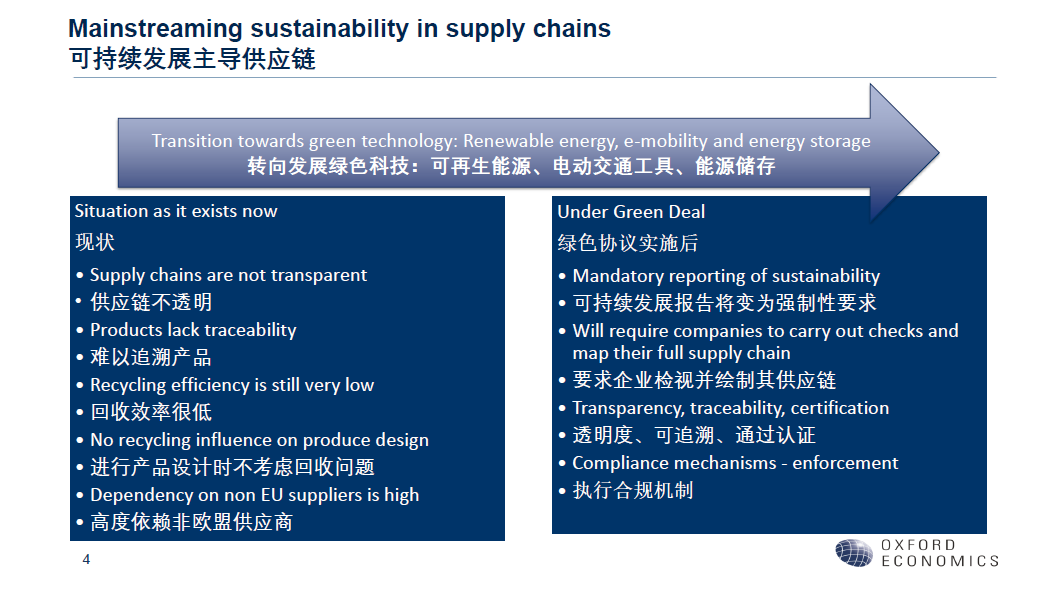
Under the framework of the Green New Deal, the Netherlands also launched a number of initiatives. Ms. Anne-Roos Wasser, Vice Consul Commercial and Economic Affairs, Consulate-General of the Kingdom of the Netherlands in Shanghai, shared the Dutch Responsible Business Conduct (RBC) agreements. The Dutch government aims to achieve the 90%goal that Dutch companies conduct due diligence throughout their supply chains with adherence to internationally agreed guidelines by 2023. Dutch announced in last October that RBC policy will be renewed, that meat Dutch will follow European Commission’s efforts to achieve the EU legislation for a mandatory due diligence obligation.
Ms. Anne-Roos shared that, the Dutch government will also set up a one-stop shop, RBC business center for Dutch business to get advice on how to improve their supply chains when doing business abroad, not only to make them more green, but also to mitigate risks in field of worker health and safety, corruption and environmental safety.
Dutch government is also pushing forward the green transition of in garment sector. To support this process, making a greener supply chain in Chinese textile industry, Dutch government has funded a large project to improve the sustainability of Chinese Dye house in the past three years, Dye House Improvement Program, focusing on the three aspects of pollution prevention, resource reduction and health and safety.
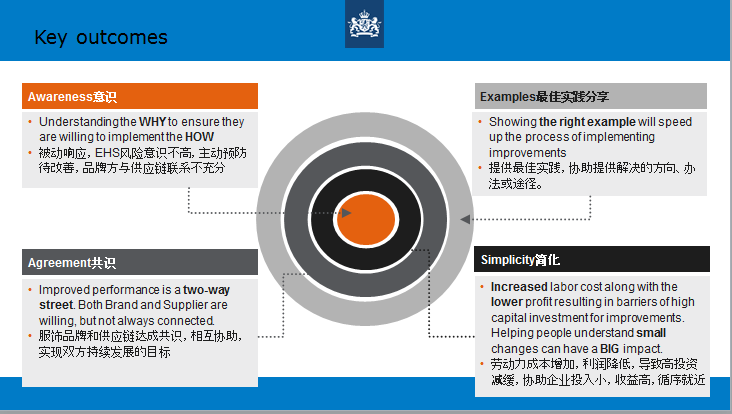
Industry Association: Platform and tools assist green transition
Mr. Christian Ewert, President, amfori, started with how green, sustainable supply chains will drive the recovery post COVID-19. He highlighted the importance of the United Nations Sustainable Development Goals (SDGs) for a recovery that leads to greener, more inclusive economies, and stronger, more resilient societies. He called on China and Europe to continue in exerting positive influence & leading the world to a more sustainable and green recovery & development.
Mr. Christian said that, in today’s fast-moving global markets, businesses are being asked to address environmental challenges in their direct operations and across their supply chain. At the same time, society is demanding greater transparency and accountability. amfori BEPI was founded in 2013 and provides a comprehensive range of services that enable companies to drive focused environmental improvements in their supply chain and to trade with purpose. This is achieved through monitoring, but amfori also engages globally with international organizations and governments on a country level to represent our members’ sustainability interests.
Mr. Xiong Huajun also introduced the efforts of Committee on Social Responsibility of CESA in developing ICT industry social responsibility standard system, the environmental responsibility of ICT supply chains and the practice and experience sharing of ICT companies on green supply chains.
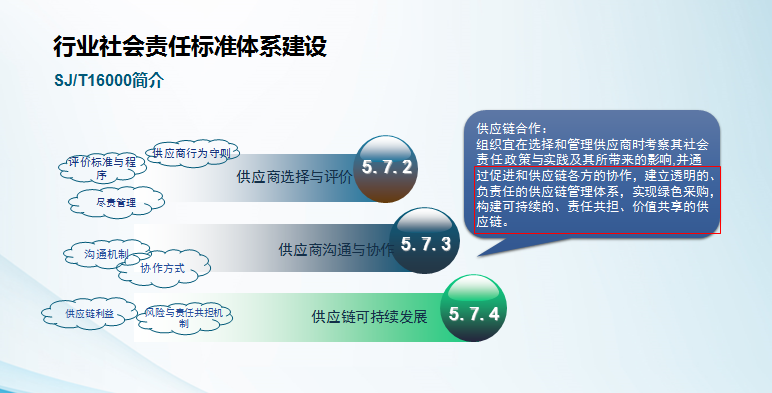
Relying on the six service platforms, the Committee on Social Responsibility of CESA actively pushes forward the green supply chains in aspects of concept, practice, international cooperation and project implementation. The measures include, hosting green, responsible procurement international cooperation and communication, and project implementation. The implementation strategies include holding China’s ICT Industry Sustainable Development and CSR Summit Forum to examine crucial topics such as green, responsible procurement, the leverage of green supply chain and circular economy, issuing the Best Practices of Green Supply Chains in ICT Industry, and launching the Green Supply Chain Innovation Pioneer Project.
Business Practices: Experience sharing helps better improvement
Mr. Jason Ho, Procurement Director, Supply Chain Assurance, Dell Technologies, shared the company’s green management practice throughout the supply chain. In four steps, namely, risk assessment, supplier audit, improvement plan and capacity building, Dell pins the sustainable development and responsible manufacturing across its supply chain with the mission of continuous improvement. During the COVID-19, Dell also responded quickly and ensured the continuity and resilience of the supply chain.
Responding to the new “In China, for China” 4.0 strategy, Dell unveiled a series of measures to promote technological innovation, economic development and green industry transition in China. For example, suppliers can improve their ability to utilize big data, automation and make innovation by establishing partnerships; Dell also engages in industry cooperation to share green supply chain management practices, resources and tools.

Mr. Adrian Bahnerth, Head of Department Sustainability & Quality Assurance in Asia, Federation of Migros Cooperative, Switzerland, introduced the key drivers, implementation and success factors of green supply chain management with detailed data and analysis.
Migros takes its responsibility to society and the environment seriously. The company identifies customer focus, impact focus and cost perspective as key drivers while taking political necessity (the demand of government on due diligence) and issues that impact the company's reputation as framework. Accordingly, four focus areas, namely, assortment, climate and energy, closed-cycle systems and social cohesion, and key success factors are summarized to boost its green supply chain management.
Migros takes its responsibility to society and the environment seriously. The company identifies customer focus, impact focus and cost perspective as key drivers while taking political necessity (the demand of government on due diligence) and issues that impact the company's reputation as framework. Accordingly, four focus areas, namely, assortment, climate and energy, closed-cycle systems and social cohesion, and key success factors are summarized to boost its green supply chain management.
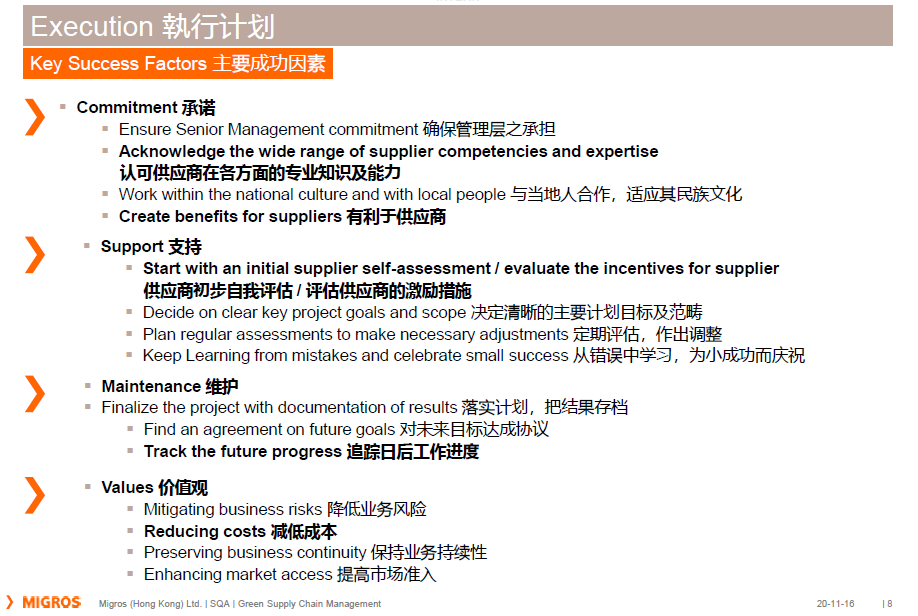
Finally, Yu Zhihong, President and Editor-in-chief, China Sustainability Tribune, concluded the forum.
First, we are embarking on a new journey of green supply chain: it can be called the green supply chain 2.0. The previous green supply chain 1.0 focuses on making supply chain greener. The green supply chain 2.0 aims at the economic transformation and supply chain transition in economic recovery.
This is a revolution and it may be reflected in three areas, 1) energy, focusing on carbon synthesis and carbon emission peaking; 2) resources, probably revolving around the circular economy; 3) compliance, indicating more new cooperation and rules.
When the supply chain is undergoing transformation, companies need more ambitious goals. Dell and Migros have shown us their vision for the 2025 and 2030.
Second, during the revolution, the role of these rules of social responsibility and sustainable development is gradually highlighted. Such as, the New Green Deal, RBC, BSCI, BEPI, the standards and social responsibility guidelines of supply chain developed by CESA, will drive the new transition of green supply chain.
Third, the transition of green supply chain will directly impact the due diligence, that is, to magnify the role of due diligence, which can reveal what actions business take for the transition of green supply chain and also integrate relevant contents in line with the new green supply chain in the process of due diligence.
Fourth, we need to give more play to technology, innovation and system, which may bring many new changes to the green supply chain.
Finally, it should start from procurement and industry associations can play a very important role, such as amfori and CESA, who advance the green supply chain on the whole.
Mr. Yu summarized that the impact of COVID-19 on the green supply chain is huge and far-reaching, making us realize the importance of a green, sustainable and resilient supply chain. More and more companies should enhance their efforts on transition of green supply chains in green recovery.
The Forum provided a live streaming channel on the internet with nearly 200,000 viewers. As a professional and practical communication platform and channel for corporate social responsibility (CSR), the Sino-European CSR Round Table Forum has focused on the building of responsible supply chain for many years, covering related topics such as employee care, harmonious labour relations, good communication mechanism and partnership between buyers and suppliers. Held 22 times in the past years, it has been well received by stakeholders and conducted with great support from participants, including relevant Chinese government departments, CSR organizations as well as Chinese and European enterprises.

Long press to scan QR code to review the highlights of the Forum
Best Practices
- The 100-year brand — Air Liquide also has a sense of juvenile
- Beijing Public Transportation Corporation: Developing green transportation to build a harmonious and livable capital
- CGN: Building a modern factory in barren deserts and developing a new win-win cooperation model along “Belt and Road”
Upcoming Event

All the materials on the site “Source: XXX (not from this site)” have been reprinted from other media. They do not imply the agreement by the site.
All the materials with “Source: CSR-China Website” are the copyright of CSR-China Website. None of them may be used in any form or by any means without permission from CSR-China Website.
GoldenBee Official WeChat
Copyright © Csr-china.net All Right Reserved.
京ICP备19010813号










